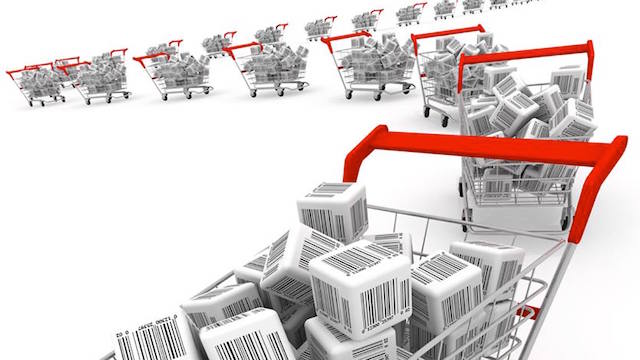Chinese B2B online shoppers are demanding personalisation, omnichannel capability and seamless integration.
That’s according to the latest research from Forrester and SAP Hybris which found customers want a B2C experience when shopping B2B.
Along with the B2B eCommerce market growing quickly, the shopping behavior of B2B buyers is changing rapidly to demand an easier and more personalised purchasing experience, according to the new study Digital Transformation Made Simple for B2B eCommerce in China.
SAP Hybris commissioned the study from Forrester Consulting to explore how B2B buyer expectations are transforming the way suppliers sell and deliver products and services in China.
“B2B eCommerce is expected to develop quickly in the future, with different industries expected to form their own eCommerce models,” said Frank Zhang, GM of SAP Hybris in Greater China. “Businesses that fail to evolve as this trend takes hold, either by building an eCommerce platform that does not meet customer needs or by failing to build a competitive eCommcerce platform, will find it difficult to compete with those that provide a personalised experience catering to the needs, habits and preferences of customers.
“This is likely to result in an impact on sales and customer retention. For B2B sellers in China, deploying eCommerce platforms with the features and functions that the China market expects needs to be a high priority.”
Charlie Bai, principal analyst of enterprise architecture with Forrester Research said that with the B2B eCommerce market gaining momentum in China, B2B sellers must accelerate their digital transformation via technology platforms to deliver a more personalised shopping experience and meet challenges from buyers with evolving demands and expectations.
The Digital Transformation Made Simple for B2B eCommerce In China study revealed four key findings:
The Chinese B2B eCommerce market is gaining momentum, with booming opportunities presented for B2B companies.
Online channels will become more mature and dominant in the B2B commerce landscape, as insightful market sellers have grasped the urgency of planning ahead for technology investments to win more market share. B2B buyers expect to significantly increase online purchases in the near future. The number of Chinese B2B buyers who make more than 25 per cent of their purchases online is likely to grow two-fold in three years’ time, which reveals the speed and scale of online purchase growth in the China B2B market.
B2B buyers expect a B2C-like shopping experience and omnichannel visibility.
B2B seller companies that emulate personalised business-to-consumer (B2C) shopping experiences are able to cater to the evolving needs and expectations of B2B buyers in China. Like consumers in the B2C market, B2B buyers have varied preferences for online business; 83 per cent of B2B buyers consider it important/very important to deliver on the same day when making work-related purchases online. Omnichannel capabilities and visibility will also better position B2B sellers confronted with buyers’ transitioning demands. When asked what was important when it came to making a work-related purchase online, B2B buyers cited the following:
- Looking up product information across each channel (68 per cent).
- Returning or exchanging products across channels (58 per cent).
- Being able to share unified account and order history (37 per cent).
- Viewing personal activities across channels (31 per cent)
B2B sellers face multiple digital challenges on their journey of transformation.
Not only do the B2B buyers need consistent and personalised experiences, they also require cross-channel visibility, just like the consumers in the B2C market do. When asked to select the barriers or challenges that have prevented their organisation from fully implementing a B2B online strategy, sellers reported the following:
- Conflicts among different channel organisations (40 per cent).
- Employee or management resistance (37 per cent).
- Difficulty of sharing customer data among channels, countries or locations (35 per cent).
B2B sellers know they must strategically accelerate digital investment to effectively meet Chinese buyers’ needs.
The survey found that 97 per cent of B2B sellers are already implementing, upgrading, or planning to invest within the next six months in an eCommerce platform to support omnichannel requirements. B2B sellers should design the eCommerce platform toward customer experience and omnichannel enablement for differentiation. The survey showed that buyers prefer sellers that can provided differentiated customer experiences. For example:
- 75 per cent of buyers want flexible price lists and product catalogs for different users.
- 72 per cent think that a differentiated customer experience is required to support personalised purchase approval workflows for customers.
For the study, Forrester Consulting interviewed 564 online business decision-makers of B2B eCommerce sellers from various verticals such as automotive, high-tech, manufacturing, consumer products, life sciences, distribution, retail, and oil and gas. In addition, Forrester interviewed 200 online business decision-makers of B2B eCommerce buyers in China that cover multinational corporations, state-owned enterprises (SOEs), and government, as well as other listed and privately owned companies. These decision-makers all come from companies with annual revenues ranging from RMB200 million to more than RMB5 billion, and they hold various leadership roles for eCommerce, including CEO, CMO, various levels of vice president as well as director and manager in a line of business/function. The study’s objective was to evaluate to explore how B2B buyer expectations are transforming the way suppliers sell and deliver products and services in China.






